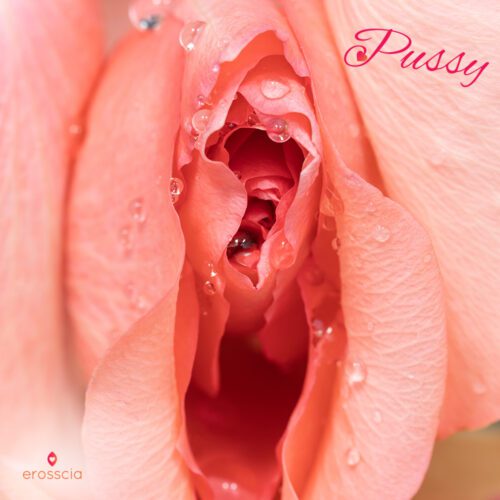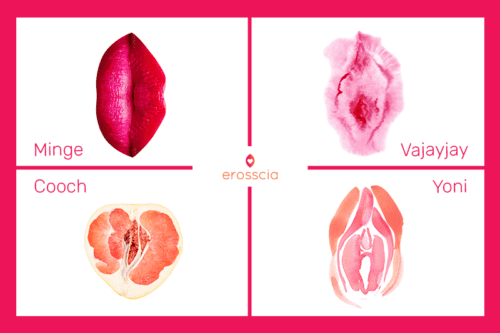Throughout time and place, there have been several words for male and female genitalia. The word for vagina itself comes from the Latin word, vāgīna, that originally meant “sheath” or “scabbard.” It doesn’t take a genius to figure out exactly how this came to refer to female genitals. However, this was considered slang at the time while “cunnus” was the more polite and technical term. In Latin, “cunnus” referred to the vulva (similar to how “vagina” is colloquially used to describe both the external and internal female genitals) and is the root of the word “cunnilingus.”
Within only the English language, there have been thousands of slang terms and euphemisms for the vagina and vulva. Some of these terms have lasted hundreds of years with little to no change to the word itself. Let’s look at some of the common words used in English-speaking countries for female genitalia and where these words come from.
Cunt
The first recorded use of the word cunt traces back to 1230 London for a street called Gropecunt Lane. “Gropecunt” was a common street name in the Middle Ages thought to refer to red light districts where sex workers and brothels were frequently found. While bluntly straightforward, cunt is still used today as a term for the vagina and is the oldest recorded slang word for the vagina still in use.
In the United States, it is largely considered a derogatory term for a woman to the point that it could silence a room. While the casual use of the term does exist within the US, Americans are more likely to use another less obscene word. In contrast, their English-speaking counterparts in Britain use it more frequently, though it usually still is used as an insult or comes with derogatory connotations. In Australia and New Zealand, cunt can even have neutral or positive meanings depending on context.
Pussy
The word pussy can be used to describe or call a cat. Adolescent boys may also call someone a “pussy” as a way to insult or tease them for being scared or exhibiting feminine attributes. While it would be rare for someone who speaks modern English to call a cat a “pussy” most are at least familiar with the term “pussycat.” Thus, the term pussy is associated largely with cats.
The first recorded use of pussy in reference to female genitalia comes in 1699. The origin itself is Germanic where many Germanic and surrounding language groups used words similar to “puse” to refer to or call pet cats. The word took on similar meanings in early English and slowly became a term of endearment with the common “y” or “ie” ending being added. In fact, pussy was once a term of endearment for women! The way it came to hold the erotic meaning is not exactly clear, but other European countries also have cat-related terms for female genitals as well.
While pussy can carry a derogatory meaning, it is usually considered less offensive than other options like cunt. Many women are also working to reclaim the word such as through the creation of “pussy hats” and the increasingly casual use of the term among women.
Fanny
The term “fanny” to refer to the vulva and vagina is mostly used in Britain. In the United States, “fanny” refers to the buttocks instead. This is a newer term for the vagina that is thought to derive from a scandalous 18th-century book called Fanny Hill: Memoirs of a Woman of Pleasure. Fanny already existed as a nickname for the women’s name Frances. Therefore, with it already tied to a woman’s name and the scandal the book caused, fanny became a vaginal slang word.
Minge
Another favorite of the Brits, the term minge usually refers to pubic hair and the vulva. The actual origin of the word comes from the Romani word “minʒ” which translates to “female genitals.” There may have also been some influence from the Latin word “mingere” which means “to urinate.” Thus, it could be describing the female genitals through one of the functions it performs (even though it’s a tad anatomically incorrect).
Vajayjay
“Vajayjay” is another newcomer to the vagina slang word lexicon. A humorous take on “vagina” it was first popularized in the American TV show Grey’s Anatomy in 2006. Due to network restrictions on how many words such as “vagina” can be said on network television, Grey’s Anatomy creator and writer Shonda Rimes coined the term to get around these limitations. It became somewhat of a 2006 meme and is still used as a humorous way to say vagina.
Yoni
You may have heard of yoni eggs, yoni yoga, or yoni tears which is the favored marketing term for vaginal products within the wellness industry. The word comes from Sanskrit and refers to the vulva and womb literally, but the word also had associations with a goddess-like representation and veneration of the vagina. Thus, for products meant to help take care of the vagina, yoni is a logical term to use.
Flower
Used mostly euphemistically, calling the vagina “the flower” may have more ancient origins than many realize. The Lotus flower was commonly used as a symbol for the vulva and vagina in Han and Ming dynasty China. The Lotus flower had an almost divine meaning and could somewhat resemble the vagina in color and appearance. While they may not have directly called the vagina a flower, the comparison likely helped inspire future comparisons.
Not used too often in modern English, it may be used by a mother to help her daughter understand changes during puberty. Flower is also still used as a metaphor for female genitals in poetry and music. Unlike many of the other words on this list, flower is one of the few words for the vagina that originally had and continues to have a positive connotation.
Hoo-Ha
The exact origins of the word “hoo-ha” is not conclusively known. However, it likely comes from a Yiddish word meaning roughly “uproar” or “exclamation.” In 1936, it was first used in a British magazine to describe excitement among the public (both in the context of a crowded event and social excitement about a new product or event).
So, how did this come to be slang for the vagina? According to Urban Dictionary, it became a popular way for teenagers to talk about sex and genitals discreetly in the 1950s. Though, at the time it could refer to both male and female genitals. When used today, “hoo-ha” or “hoo-hah” usually means vagina or vulva.
Cooch
Cooch–short for coochie and sometimes written as cootchie–is used primarily in the United States. The term came to refer to female genitals by the 1990s. However, the popularization of the word stems back to the 1950s and the blues song “Hoochie Coochie Man” by Willie Dixon. The song uses a suggestive phrase that relates to an erotic dance, somewhat similar to belly dancing, that was performed at carnivals and fairs in early America. Though, the only known record was at the 1893 World’s Fair.
Heat
If you want to see the full breadth of terms for genitals, a modern erotic romance novel will certainly deliver. One gaining popularity is to refer to a woman’s “heat.” This obviously means her genitals. This is fairly clever because the genitals tend to be the warmest part of the body (this includes the penis as well). From a male perspective, the vagina often feels warm inside and thus from both perspectives, heat is a fair description. Also, it does not have any derogatory or negative connotations.
The origins of “heat” as it relates to the vagina is not exactly known and it seems to be a fairly modern usage. Heat could refer to female sexual arousal in animals by the 1700s. While not used to describe sexual arousal in human females, it is not a stretch to see how the term may have evolved.
Treat Your Vag To A New Vibrator
No matter what you call it, the vagina deserves to be well cared for and pleasured. Like the vagina, vibrators have gone by many names, but there has never been a vibrator like Erosscia. Taking advantage of an existing motor you likely already have in your home–an electric toothbrush–Erosscia makes body safe attachments that fit on the toothbrush base in place of the head. With vibrations scientifically proven to feel the most pleasurable, an electric toothbrush is absolute heaven for the vagina.
Erosscia vibrators are not limited to the vagina or people with vaginas. They can safely be used nearly anywhere on the body as a personal massager and is perfectly safe for insertion into the anus and mouth. Since the silicone attachment can detach from the toothbrush, it can be completely disinfected and cleaned without the worry of damaging it.
Get to know your vajayjay, fanny, or pussy better with the best g-spot vibrators. Try out one of Erosscia’s sleek vibrator toothbrush head attachments. Order yours through Erosscia’s online store.
Sources:
https://www.etymonline.com/
https://en.wiktionary.org/wiki/Wiktionary:Main_Page
https://www.urbandictionary.com/
Own the most exciting, inclusive, elegant & ethical sex toy bringing you 🤯 orgasms, available in these colors:

Allore
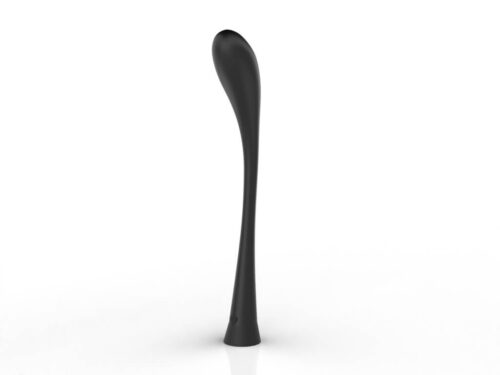
$49.95
Ceola

$49.95
Okamei
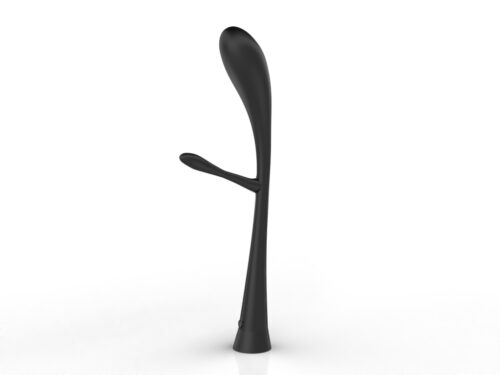
$54.95
Allore & Ceola Bundle
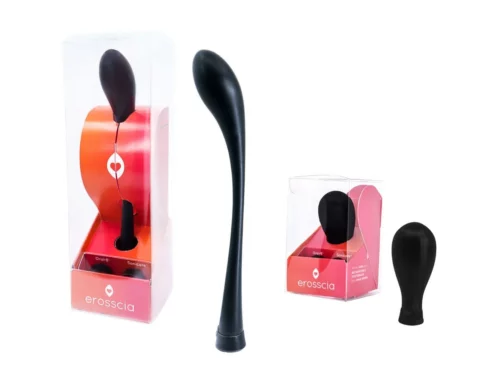
$84.95
Ceola & Okamei Bundle
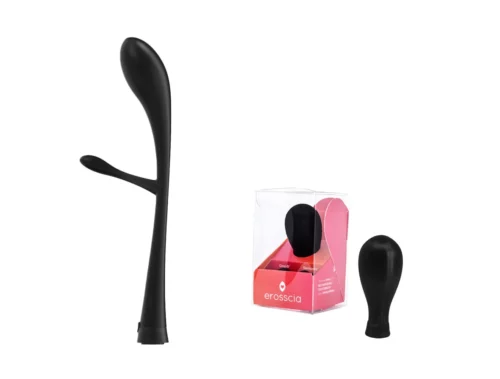
$88.95
Allore & Okamei Bundle
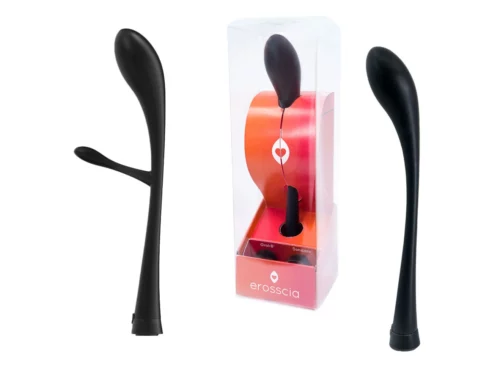
$88.95
Allore, Okamei & Ceola Bundle
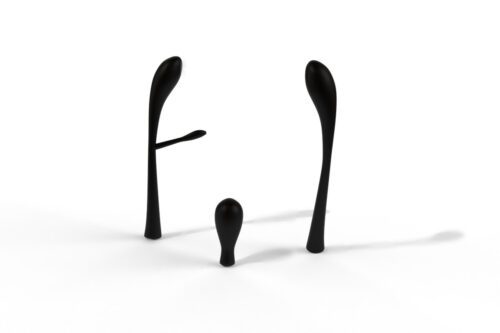
$126.95

UNCOVER THE SEXY DEETS!
Start your journey & receive pre-order discounts, special offers, new product announcements and our latest blogs 💞


